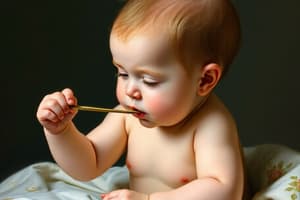Podcast
Questions and Answers
At what age does a child typically begin to grasp a rattle?
At what age does a child typically begin to grasp a rattle?
- 4 months
- 7 months
- 5 months (correct)
- 6 months
When can a child transfer objects from one hand to the other?
When can a child transfer objects from one hand to the other?
- 7 months (correct)
- 6 months
- 8 months
- 9 months
Which milestone is associated with 10 months of age?
Which milestone is associated with 10 months of age?
- Gross pincer grasp
- Fine pincer grasp (correct)
- Banging objects together
- Raking motion
What significant action can a child perform at 12 months old?
What significant action can a child perform at 12 months old?
Which of the following occurs at 9 months of age?
Which of the following occurs at 9 months of age?
At which age does a child typically begin to display a fine pincer grasp, characterized by the ability to pick up small objects between the thumb and index finger?
At which age does a child typically begin to display a fine pincer grasp, characterized by the ability to pick up small objects between the thumb and index finger?
Which developmental milestone demonstrates a child's ability to offer objects to others?
Which developmental milestone demonstrates a child's ability to offer objects to others?
What is the primary motor skill that can be observed when a child is 7 months old?
What is the primary motor skill that can be observed when a child is 7 months old?
Which action signifies that a child is developing better control of objects at 6 months of age?
Which action signifies that a child is developing better control of objects at 6 months of age?
At what age does a child start making simple marks on paper, which is an indication of developing fine motor skills?
At what age does a child start making simple marks on paper, which is an indication of developing fine motor skills?
At what age can a child typically begin to bang objects together?
At what age can a child typically begin to bang objects together?
Which activity indicates that a child is demonstrating a gross pincer grasp?
Which activity indicates that a child is demonstrating a gross pincer grasp?
What is a common behavior of a child around 5 months of age?
What is a common behavior of a child around 5 months of age?
What action does a child perform at 11 months of age?
What action does a child perform at 11 months of age?
At which age does a child typically show the ability to feed themselves with a cup?
At which age does a child typically show the ability to feed themselves with a cup?
Flashcards
Infant hand development at 1 month
Infant hand development at 1 month
Fists mostly clenched, involuntary hand movements
Infant hand development at 3 months
Infant hand development at 3 months
Holds hand in front of face, hands open
Infant hand development at 5 months
Infant hand development at 5 months
Grasps rattle
Infant hand development at 9 months
Infant hand development at 9 months
Signup and view all the flashcards
Infant hand development at 12 months
Infant hand development at 12 months
Signup and view all the flashcards
What does a 4-month-old do with their hands?
What does a 4-month-old do with their hands?
Signup and view all the flashcards
What is a 'gross pincer grasp'?
What is a 'gross pincer grasp'?
Signup and view all the flashcards
What can a 6-month-old do with objects?
What can a 6-month-old do with objects?
Signup and view all the flashcards
What is a 'fine pincer grasp'?
What is a 'fine pincer grasp'?
Signup and view all the flashcards
What can an 11-month-old do with objects?
What can an 11-month-old do with objects?
Signup and view all the flashcards
What are the first hand movements in a baby?
What are the first hand movements in a baby?
Signup and view all the flashcards
When can a baby grasp a toy?
When can a baby grasp a toy?
Signup and view all the flashcards
What's a gross pincer grasp?
What's a gross pincer grasp?
Signup and view all the flashcards
What's a fine pincer grasp?
What's a fine pincer grasp?
Signup and view all the flashcards
When can a baby feed themselves?
When can a baby feed themselves?
Signup and view all the flashcards
Study Notes
Infant Motor Skill Development Milestones
-
One Month: Fists mostly clenched, involuntary hand movements are characteristic.
-
Three Months: Infants hold their hands in front of their face with their hands open.
-
Four Months: Reaching and pre-grasping movements develop; infants bat at objects.
-
Five Months: Infants begin developing grasps, holding objects like rattles.
-
Six Months: Objects are released by one hand to grasp another object; this shows increasing object manipulation.
-
Seven Months: Transferring objects from one hand to the other is a significant milestone.
-
Eight Months: Developing a "gross pincer grasp" where objects are raked or scooped up.
-
Nine Months: Objects are banged together, indicating exploration and interaction.
-
Ten Months: Fine pincer grasp emerges, allowing objects to be placed into and removed from containers.
-
Eleven Months: Offering objects to others and relinquishing them displays social interaction.
-
Twelve Months: Infants feed themselves with utensils like cups and spoons and demonstrate fine motor skills by making marks on paper and poking with their index fingers.
Studying That Suits You
Use AI to generate personalized quizzes and flashcards to suit your learning preferences.




